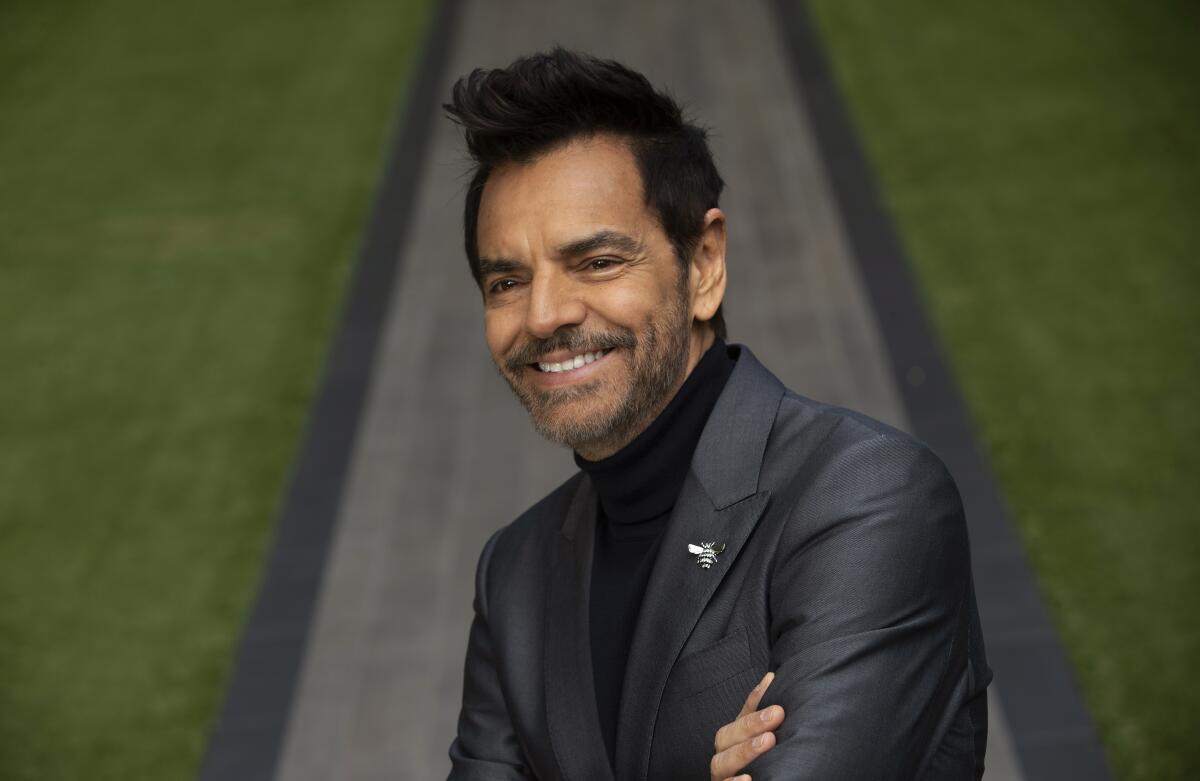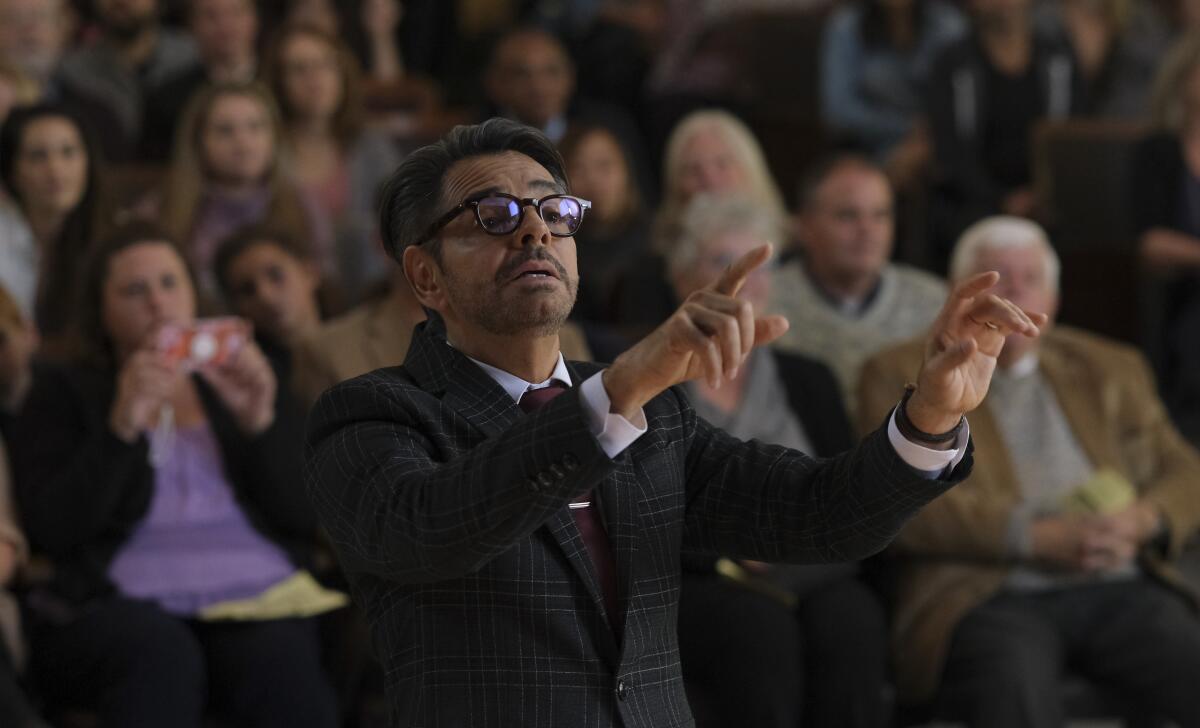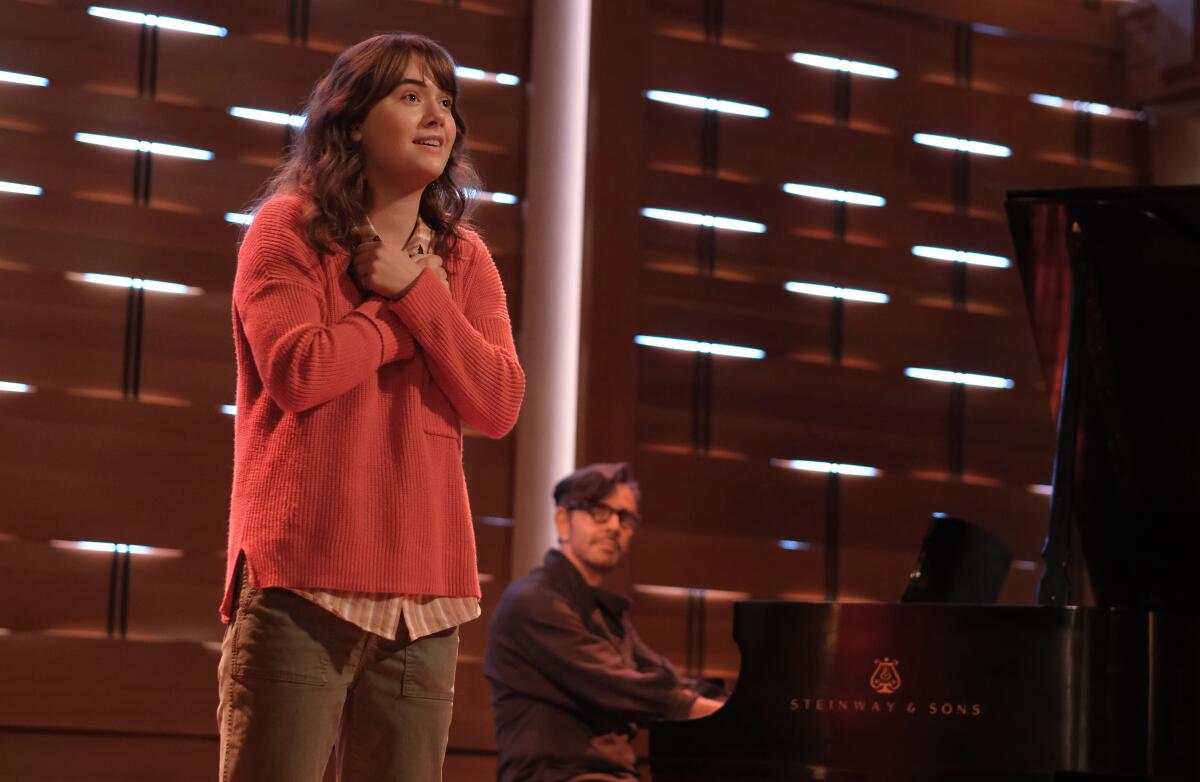Eugenio Derbez brings flair to his tough-love ‘CODA’ music teacher

- Share via
Mexican superstar Eugenio Derbez, dubbed the “No. 1 most influential Hispanic male in the world” by Variety in 2014, may not seem the likeliest actor to play a high school choirmaster living in the tight-knit, minimally diverse fishing community of Gloucester, Mass. But as a performer dedicated to breaking stereotypes, Derbez memorably inhabits the role of tough-love music teacher Bernardo Villalobos (a.k.a. Mr. V.) in writer-director Sian Heder’s touching drama “CODA,” an American remake of the 2014 French hit “La Famille Bélier.”
His invigorating turn as the irascibly wise Mr. V., who coaches aspiring singer and CODA (child of deaf adults) Ruby (Emilia Jones) for an audition at Boston’s prestigious Berklee College of Music, is a serious departure for the actor known for such lighter movie fare as the worldwide smash “Instructions Not Included,” “How to Be a Latin Lover” and the 2018 remake of “Overboard.”
The warm and ebullient Derbez, who moved from Mexico City to L.A. in 2014 and co-founded the production company 3Pas Studios, called in from the set of his latest film, “Aristotle and Dante Discover the Secrets of the Universe,” to chat about creating Mr. V., altering perceptions, his musical chops and more.
It really seemed like you made the character of Mr. V. your own. What was he like as written and how did you shape him?
The character was more like a normal teacher. But I told the director, Sian Heder, that I wanted to make this teacher different… I wanted to make him this kind of teacher I think we all had in our life at a certain point: a teacher who made our life miserable. But at the end, you remember them with love because you realize they… were probably very demanding because they cared. I worked with her [Heder] very closely to come up with this guy.

Did you improvise much?
Yes, a lot. Especially the scene when I’m dividing the kids up by tenor, soprano and so on. I was making fun of them — how they look, how they sing. Unfortunately, they had to cut a lot of the comedy, but it was a very funny scene.
Did you ever have a teacher who affected you the way Mr. V. affects Ruby?
Absolutely. I had a teacher when I was in high school, and he was really mean and strict. I hated him. But you know what? He was probably the best teacher I had because… the truth is that he really cared about us.
Mr. V. comes off as super-talented, but we’re not told a lot about his musical past. Do you think he had his own performing ambitions?
We created this backstory where he supposedly was a big pop star in Mexico and Latin America. And then one day he tried to cross over [in the U.S.] and he failed. At that point, he decided to quit and he ends up teaching music in Gloucester, Mass. He discovers that he’s good at teaching and he loves music. But he’s not a normal teacher — he’s a musician [first]. When he realizes that Ruby has talent, he helps her, because he wants her to become what he couldn’t be.

How musical are you in real life?
I learned a little bit of piano when I was a kid, but I had to relearn how to play the piano [for the movie]. I also had to learn how to direct a choir and how to teach singing. Fortunately, I worked with a great piano and musical instructor, Liz Kinnon, who also coached Ryan Gosling on “La La Land.” [Still], this film was really a challenge for me as an actor. I really had to get out of my comfort zone.
Mr. V. has quite the distinct fashion sense. How much input did you have about your look?
[Laughs] A lot. I would almost say 100%… [Sian] wanted me to be like more “normal,” but I wanted Bernardo to have this crazy long hair — my bangs were down to my chin. I wanted him to have this unique personality, and not just internally. I wanted him to be dressing as a pop star. The wardrobe [department] didn’t get it, so I came up with my own. At least 90% of what I was wearing was from my personal wardrobe.
I’ve heard you compare the children of immigrants to CODAs. It’s a really astute observation. Tell me more.
I feel the movie resonates with a lot of people. For example, any immigrants here in the U.S. talking another language. Now I’m going to talk about my people, Latinos: I see a lot of them are scared of making mistakes when they speak, they don’t want to speak in English. So when they have kids, they want their kids to learn English 100% so they can help them translate when they go to the doctor, a lawyer, the DMV. But [these children] sometimes feel a responsibility not to go and achieve their dreams because they have to stay close to their families to translate. It was very powerful when I discovered that.
More to Read
From the Oscars to the Emmys.
Get the Envelope newsletter for exclusive awards season coverage, behind-the-scenes stories from the Envelope podcast and columnist Glenn Whipp’s must-read analysis.
You may occasionally receive promotional content from the Los Angeles Times.











